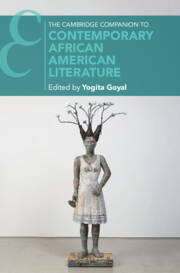Book contents
- The Cambridge Companion to Contemporary African American Literature
- The Cambridge Companion to Contemporary African American Literature
- Copyright page
- Contents
- Contributors
- Acknowledgments
- Chronology
- Introduction
- Part I Histories of the Present
- 1 African American Citizenship in the Post–Civil Rights Era
- 2 The Politics of Class
- 3 Rethinking Post-Racialism
- Part II African American Genres
- Part III Mapping New Identities and Geographies
- Part IV Critical Approaches
- Further Reading
- Index
- Cambridge Companions To …
2 - The Politics of Class
from Part I - Histories of the Present
Published online by Cambridge University Press: 14 December 2023
- The Cambridge Companion to Contemporary African American Literature
- The Cambridge Companion to Contemporary African American Literature
- Copyright page
- Contents
- Contributors
- Acknowledgments
- Chronology
- Introduction
- Part I Histories of the Present
- 1 African American Citizenship in the Post–Civil Rights Era
- 2 The Politics of Class
- 3 Rethinking Post-Racialism
- Part II African American Genres
- Part III Mapping New Identities and Geographies
- Part IV Critical Approaches
- Further Reading
- Index
- Cambridge Companions To …
Summary
This chapter assesses the interplay among social class and the growing centralization of African American literature in the marketplace. Since the 1980s the production of black literature has been increasingly shaped by the economic and aesthetic priorities of commercial bookselling. Contemporary African American writers have expressed their awareness of the ways that the commodification of black literary expression has both imposed limits and created new possibilities for literary art. These authors have been particularly attentive to new patterns of consumption and reception that emphasize class distinctions among consumers and genres of writing. These changes have prompted writers to rethink traditional assumptions about the social and aesthetic obligations of black middle-class writers in forging alliances with the working class. The chapter considers these shifting social relations with reference to literary works by Paul Beatty, Trey Ellis, Percival Everett, Mat Johnson, Claudia Rankine, and Colson Whitehead.
Keywords
- Type
- Chapter
- Information
- Publisher: Cambridge University PressPrint publication year: 2023



